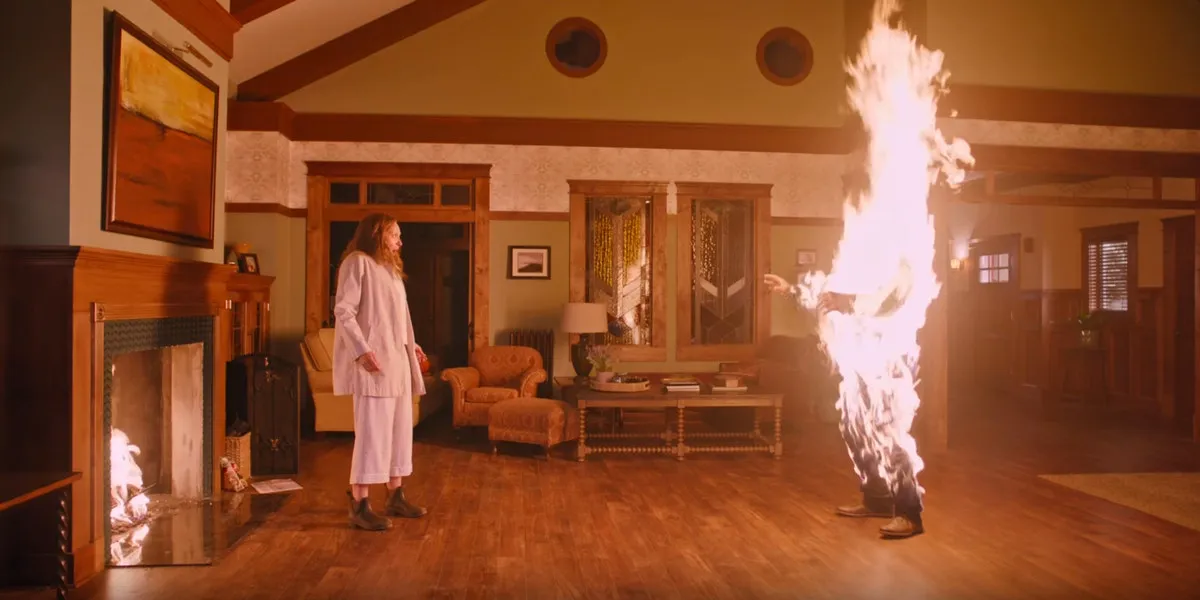
Hereditary (2018), directed by Ari Aster, starring Gabriel Byrne, Toni Collette, Alex Wolffe, Milly Shapiro and Ann Dowd.
NOTE: Mild spoilers ahead.
This film, Aster’s first full-length feature, attracted a lot of critical praise and buzz when it was released in June. I recently streamed it, and thought it was creepy, but I also found it somewhat disappointing after all the hype. Billed as a family drama with supernatural overtones, Hereditary doesn’t deliver in the first instance because the main characters are distant and simply not very likable. In the second instance, the unattractiveness of the family makes the horrific things that happen to them not all that scary, because the audience doesn't like them enough to care. There are horrific images and scares aplenty if the viewer hangs in until the last third of this rather long film, but they might as well be happening to department store mannequins for all the emotional involvement the flat characters wring from the audience.
The story focuses on a family headed by Steve and Annie Graham (Gabriel Byrne and Toni Collette) and their two children, 13-year-old Charlie (new comer Milly Shapiro) and an older teen, Peter (Alex Wolffe, from the recent Jumanji reboot.) Annie has an odd occupation as an artist who creates installations of miniature people and buildings, and she comes across as cold, self-absorbed and unapproachable. The talented Byrne is wasted as a weak and ineffective father, Steve. Charlie is a weird and unattractive adolescent girl who may be autistic and who also has a severe, frightening nut allergy. Only Wolffe as Peter is at all sympathetic, and then only toward the end, when his fate begins to turn extremely dark.
The family starts to unravel from the very beginning of the film, after Annie’s mother, Ellen, dies from a lingering battle with cancer. Ellen spent her last days at Annie’s house, but it’s clear that mother and daughter were estranged before that and that Annie didn’t know her mother very well in her later years. She joins a grief support group, but her participation is obviously more about Annie feeling guilty for not being close to her mother than it is about her actual grief.
Shortly after Ellen’s funeral, however, Annie experiences real grief when Charlie dies in a horrific freak accident (it’s very horrific—trust me on this one.) She goes back to the grief support group, but this time, she meets a friendly woman named Joan (Ann Dowd) who claims to be grieving for a lost son and grandchild. Joan befriends Annie and then shows her how to connect with the dead in a seance ritual. Eventually, Annie uses the ritual in an attempt to communicate with Charlie. Unfortunately, she inadvertently calls up something far, far worse than Charlie’s departed shade, and the entire Graham family pays a terrible price for this mistake.
While the awful thing that Annie summoned wrecks havoc on her household, she also discovers that her mother and Joan were members of a demon-worshipping cult together.( In a stroke of effective black humor, Annie discovers that the homey, hand-hooked rugs that Ellen made for her family are patterned in demonic occult symbols--the film needs more of this).
Ellen also had an even darker secret, but only poor Peter gets to discover what it was, in the last few minutes of the film, which are overly expository and ham-handed--there's no need to explain what's going on after it's already been made plain a few moments before.
Interestingly, I streamed this film not knowing much about it except for bits and pieces from non-spoiler reviews, but those bits and pieces reminded me instantly of the Stephen King short story, Gramma. This story was made into one of the more memorable episodes from the mid-80s reboot of the Twilight Zone; it was adapted for television by sci-fi/fantasy legend Harlan Ellison. Gramma concerns a 12-year-old boy who’s left alone one night with his dying grandmother, whom he fears greatly, while his parents are visiting his sick brother in the hospital.
Two-thirds or so into Hereditary, I found that my instincts were correct; the Aster film has virtually the same plot as Gramma—it’s just been expanded to include more characters. Judge for yourself: here's a quick-and-dirty YouTube link to the episode: 
This made me wonder whether Aster has ever read the story or seen the television adaptation of Gramma. Sadly, for horror fans, there usually is really nothing new under the sun.